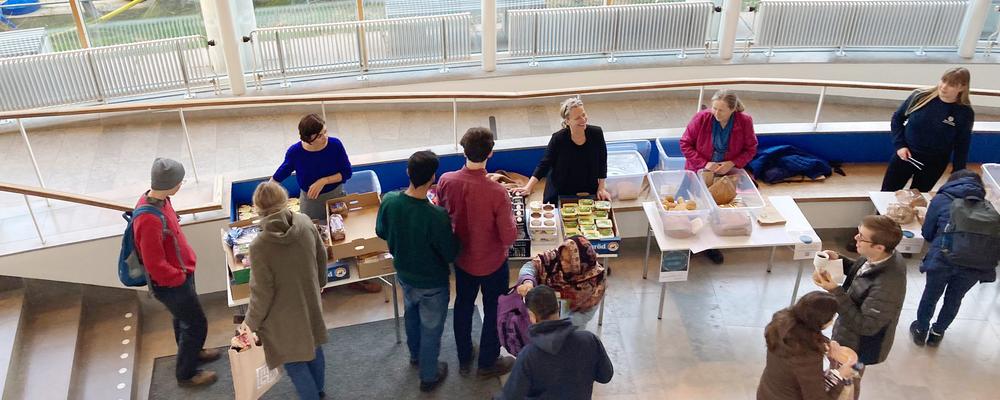Maria José Zapata Campos, senior lecturer and researcher at the School of Business, Economics and Law, is one of the people behind the initiative.
What is a solidarity fridge?
Solidarity fridge is a citizen-driven initiative to save food waste from grocery stores, bakeries and similar. The concept is simple. Food that would otherwise be thrown away, is collected and saved by volunteers, members, of the Soldarity Fridge. For example bread that has not been sold, or products whose best-before date is close or has passed, but which are still suitable for consumption. The food is then distributed to anyone interested.
At the School, we have created a solidarity fridge in a collaboration between students (the Student Union and the association Handels Students for Sustainability - HaSS) and staff. At the premiere, roughly 100 people helped to save food, most of them students from the School of Business, Economics and Law, but also some students from the Faculty of Social Sciences and some from the staff. We picked up the food the day before from a bakery and a grocery store, with the help of the organization, Solidariskt Kylskåp (Solidarity Fridge) which has agreements with several companies. We also managed to recruit new volunteers to continue collecting and distributing food once a week from November.
Why is this important?
On a global level, one-third of all food produced goes to food waste, with major consequences for carbon dioxide emissions and increased climate change. Structural changes are necessary for a transition towards more sustainable food systems. But measures at the end of the consumption chain, such as food networks and solidarity fridges, are also relevant to optimize food consumption and reduce carbon dioxide emissions, as well as to increase public awareness of the issue.
With a solidarity fridge at the School of Business, Economics and Law, we want to draw attention to the issue of more sustainable food production and consumption through this type of event, where we show and explain about food waste. It becomes very educational when food rescuers see the large amount of food that would otherwise be thrown away. The ambition is to connect this type of event with lectures about a more sustainable food system, and expand the activities to, for example, creating more knowledge for cooking with limited resources.
We also want to show that it is possible to open the university’s doors and premises to the public for the city's residents to practice sustainability, e.g., through a solidarity fridge but also a bicycle repair workshop and other sustainability initiatives. Those kinds of activities build commonality among students and staff, create knowledge, and allow students and others to interact as colleagues and neighbours, as we all are.
Read more about Solidarity Fridge at the School of Business, Economics and Law.
